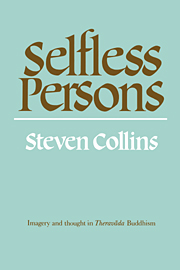Book contents
- Frontmatter
- Contents
- Dedication
- Preface
- Introduction
- Part I The cultural and social setting of Buddhist thought
- Part II The doctrine of not-self
- Part III Personality and rebirth
- Part IV Continuity
- 7 Conditioning and consciousness
- 8 Momentariness and the bhavanga-mind
- Conclusion
- Notes
- Bibliography
- Glossary and index of Pali and Sanskrit terms
- General index
8 - Momentariness and the bhavanga-mind
Published online by Cambridge University Press: 18 December 2009
- Frontmatter
- Contents
- Dedication
- Preface
- Introduction
- Part I The cultural and social setting of Buddhist thought
- Part II The doctrine of not-self
- Part III Personality and rebirth
- Part IV Continuity
- 7 Conditioning and consciousness
- 8 Momentariness and the bhavanga-mind
- Conclusion
- Notes
- Bibliography
- Glossary and index of Pali and Sanskrit terms
- General index
Summary
Scholasticism. 2. Servile adherence to the methods and teaching of the schools; narrow or unenlightened insistence on traditional doctrines and forms of exposition.
Oxford English DictionaryNothing is more dangerous to reason than flights of the imagination, and nothing has been the occasion of more mistakes among philosophers.
David Hume, A Treatise of Human Nature, Book 1, Part iv, Section 7. . the power of imagination, a blind but indispensable function of the soul, without which we should have no knowledge whatsoever, but of which we are scarcely ever conscious.
Immanuel Kant, Critique of Pure Reason, Transcendental Analytic, Book 1, Chapter 1, Section 3 (A78, B103)In Chapter 7, I discussed the fundamental attitude to, and some crucial ideas about, temporality and continuity in Therāvada thought; and I connected these with certain broad themes in socio-cultural perception in the peasant, agricultural life of Buddhist societies. In the present chapter, I shall continue and complete the ‘ultimate’ account of continuity in Theravāda thought, in the ideas (found largely in the commentarial tradition and thereafter) of ‘momentariness’ and of ‘the bhavahga’. This latter is a term usually suffixed by -citta or -manas, ‘-mind’ or -sotas, ‘stream’. I shall continue with the method of studying patterns of imagery – here those of a chariot, and of rivers or streams, and water generally – but I shall not be concerned to trace any direct connexion between the use of such images in the philosophy and psychology of Buddhism and wider structures of social perception.
- Type
- Chapter
- Information
- Selfless PersonsImagery and Thought in Theravada Buddhism, pp. 225 - 261Publisher: Cambridge University PressPrint publication year: 1982



